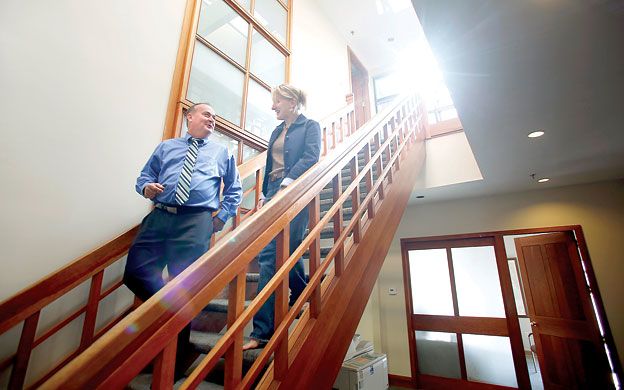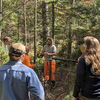John Hallé banks on new industries in Maine's wood basket
John Hallé plans to throw a party at the Great Northern Paper Co. mill in East Millinocket on the one-year anniversary of the paper mill's reopening later this month. He's hoping the celebration will reinforce the message that his company's 2011 purchase of that mill and its sister mill in Millinocket is a long-term investment.
"Our message is: We're here to stay," says Hallé, president and CEO of the Portsmouth-based private equity firm Cate Street Capital, which specializes in green technologies and environmentally sustainable investments. "We're jazzed up about the anniversary. Our employees are sold on the Cate Street philosophy — they weren't sold on day one — they know now we don't intend to run it a couple of years and then move on. In 2022, we'll still be operating Great Northern Paper."
Hallé, who's 51, founded Cate Street in 2009 after more than 25 years as a successful dealmaker with several entrepreneurial financial companies, including the Herrick Co., one of the nation's largest and most successful real estate investment firms. He considers the period of working with Norton Herrick "as the most formative seven years of my career," saying it taught him how to focus on an issue, motivate people and identify opportunities to make money where others see only problems.
A serious illness several years ago proved to be the catalyst that led to the formation of Cate Street Capital. "That's when the seed was planted to use what I'd learned from life, take it in a different direction and try to make a difference," Hallé says.
The paper mills in East Millinocket and Millinocket are a case in point. Roughly 450 people lost their jobs when the East Millinocket mill closed in April 2011, not quite three years after 150 jobs were lost when the Millinocket mill stopped making glossy paper for magazines, catalogs and newspaper inserts. The region's unemployment rate spiked to 21%.
When the East Millinocket mill reopened last October — soon after Cate Street, with help from the LePage administration, closed a complicated deal with previous owner Brookfield Asset Management — 215 people were put back to work.
Since then, Hallé says another 42 jobs have been added and there are plans to add 16 more by year's end. The mill has a backlog of orders through the end of the year and a second paper machine is being restarted, adding another 50,000 tons annually to the 150,000 tons made by the main paper machine. By spring 2013, Great Northern's employment could hit the 300 mark.
Hallé says Cate Street's focus on renewable energy and green technology enabled it to see the former Katahdin Paper Co. properties from a slightly different perspective than the paper mills' previous owner, which cited high oil costs as a factor in closing the Millinocket mill. The green movement is happening for a reason, he says, largely because fossil fuels such as oil and coal are expensive, harmful to the planet and human health. He says that creates an incentive to find alternative sources of energy that are renewable and reduce dependence on fossil fuels and Mideast oil — a business opportunity, in other words.
Enter Thermogen Industries LLC, a Cate Street subsidiary that paid more than $20 million in 2011 for the North American rights to Scottish technology that uses microwave heat to make "torrefied" wood pellets. It burns like coal — having the same BTU heat output, hence the tag "biocoal" — without coal's noxious pollutants.
That's a big plus, particularly in the United Kingdom, where government regulations are requiring coal-fired plants to reduce emissions or face closure. Another plus is that it can be used in coal furnaces without incurring the conversion costs associated with lower-BTU, higher-water-content wood pellets.
Closer to home, Hallé sees a potential market for Thermogen's Aurora Black pellets as a cost-effective alternative to oil for heating homes and small businesses.
"Maine Energy Systems [Les Otten's company in Bethel] makes a wood pellet furnace that's fully automatic," Halle says, citing a comparative fuel cost that's equivalent to just under $2 per gallon for heating oil. "We're doing tests now to see if it makes sense to incorporate that into our business plan. To us, it's an alternative market … Being able to use a renewable resource that's made entirely in Maine means the money that you'd be paying for oil now stays in Maine. Every step of the process involves people doing the job in Maine."
If all goes according to plan, Cate Street expects to open the Thermogen plant by next fall — an investment of more than $66 million. The biocoal plant is expected to employ 36 workers and produce 100,000 tons of biocoal for export to the United Kingdom and Europe. Halle says up to five torrefied wood machines are planned, which would bring Thermogen's total investment in Millinocket to $250 million, create up to 130 direct jobs and produce up to 500,000 tons of biocoal per year.
Hallé says Cate Street's Thermogen project in Millinocket and the reopened Great Northern mill in East Millinocket are a perfect marriage of green energy technology and a traditional industry, since up to 250,000 tons of wood waste from papermaking are being used to make each 100,000 tons of biocoal.
"We saw it as a great site," Hallé says of the combined properties' proximity to rail access and the Golden Road, with its 300 daily truckloads of wood harvested according to Forest Stewardship Council standards in northern Maine's 5-million-acre wood basket.
Add to that equation: Deep-water ports in Eastport and Searsport for shipping biocoal to Europe; an experienced work force; a long-term power agreement for hydropower electricity at below-market rates; and a $40 million tax credit under the $250 million New Market Capital Investment Program approved by the Legislature last year.
For Hallé and his partners at Cate Street Capital, those unique assets helped leverage a long-term investment with strong potential for sustaining several elements of northern Maine's economy.
"There's a lot of satisfaction you get out of this, and it's not necessarily monetary," Hallé says. "There's quite a bit of satisfaction that comes from making a difference in other people's lives … A good business deal is when both sides share equally in the benefits."
DOWNLOAD PDFs
John Hallé talks new Northern Maine markets
Read more
Stephanie Volo keeps Planet Dog on track with its mission and market
Fortunat Mueller and Phil Coupe shine light on renewable power
Don Gooding trains Maine entrepreneurs
Jean Maginnis connects art, business to drive Maine's economy
Luke Livingston launches brewery, trend bringing commerce to Lewiston
Susan Shaw fights pollutants to keep Maine's coast open for business
Adam Wintle energizes his family farm with an innovative new business
FHC's Keri Seitz keeps focus on brain surgery
Stephanie Volo keeps Planet Dog on track with its mission and market
Fortunat Mueller and Phil Coupe shine light on renewable power
Don Gooding trains Maine entrepreneurs
Jean Maginnis connects art, business to drive Maine's economy
Luke Livingston launches brewery, trend bringing commerce to Lewiston
Adam Wintle energizes his family farm with an innovative new business















Comments